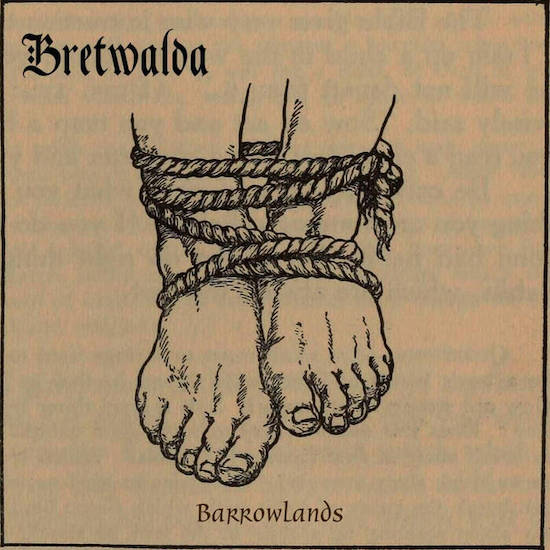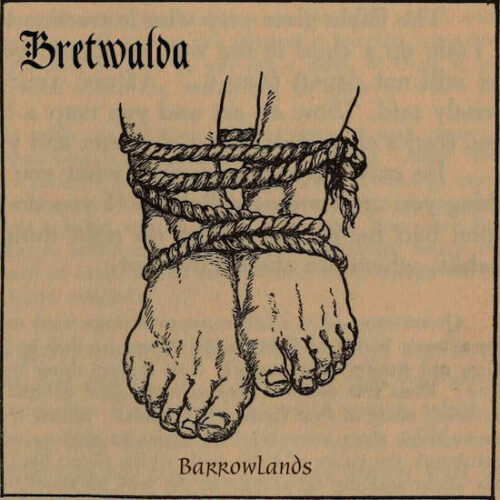Bretwalda is the project of Simon Gould, an ex-pat literature teacher based in Thailand. Looking back toward his native England, Gould finds enough tension, discord, and trouble within the notion of Englishness to embark on a series of ‘sonic papers’. Dealing with syncretic faith and folk metaphysics, these serve as a means of trying to re-engage with a national identity that seems usurped by the right wing and conservative rhetoric of post-imperial essentialism.
At first glance, it might seem that religion is a curious place to start, but actually as I listen to this and think it through, it occurs that in the curious amalgamation of various theological traditions: Pagan, Roman, Saxon, Norse and latterly Christian (Gould’s timescale here is medieval), we might begin to find the molten content of the forge of English beliefs and values in embryonic form. Indeed, it is symptomatic of Gould’s problem with Englishness that even in writing the previous phrase I feel a little sticky (though I’ll concede that my own Englishness, should I elect to call it that, is by no means straightforward).
But, the origins of folklore, morality, belief and ritual still resonate in English culture. Think of Penzance’s Montol festival, or the more recent but dark, often unarticulated undertones of the Lewes Bonfire Night celebrations. In England (Cornwall aside) perhaps these things are less openly practiced or historically known than other countries of the British Isles. I wonder if this is a symptom of the Victorian era coupled with the legacy of figures like Cecil Sharp and their subjugation of folk history to their own moral agency? Certainly, Georgina Boyes and Vic Gammon have made that argument. In the grizzly Brexit soup of rank ideology though, perhaps now is an apposite time to look backwards in an attempt to discern a more holistic and less loaded view of English identity? I am mindful here of poet John Hall’s disarmingly complex question, ‘Who are you a we with?’
What we hear here are composite musical pieces that manifest as part drone, part dub, part industrial works, that have at their core various texts that eke out meaning and exploration via their juxtaposition to sound. There is of course, a huge danger in a project like this that a preoccupation with mysticism and ritual might manifest in a wash of grotesque ‘Celtic’ reverbs and poorly placed Picardy thirds. Something that I am glad to report that Gould manages to avoid with what appears to be a quite skilful appropriation of sacred music, which he then treats quite brutally within his compositional process. I mean this as a complement, as too much deference to this stuff would certainly harm the project. As such, I think the material is well-judged and introduces just enough of plainsong and chant to provide necessary context without feeling overly earnest, or indeed like a crass modernising of the forms. That said, I think I could live without the chime sounds of ‘Imperial Syncretism’, which feel to me like the only weaker choice here. Elsewhere, timbres are tasteful and effective, and percussion, when it happens, is powerful in its simplicity and oddness.
The texts are an interesting selection, taking in the Gospel of John, R. Hutton’s writing on Pagan religion in the British Isles, and – most interestingly – sections from the writing of Julian of Norwich, a plague era anchoress whose near-death visions from a walled up cell left her a legacy as one of the great Christian mystics. ‘A Shewing in Norwich’ is a highlight of the release for me. The most spatially adventurous and affecting part of the record. The manipulation of the voice working in tandem with the archaic dialect to tease away meaning in a way that enforces close and repeated listening. This is the thing though, when Gould is brave this really works very well, and his use of concrète and collage are tremendous. Listen over to ‘A Body in the Mill Pond’ for a fine example of what I mean here.
Though he’s been generous enough to describe the project quite fully on his Bandcamp page, it should be noted that the project is esoteric, and without supporting text it might be difficult to fathom its true depths. As much as I enjoy the recordings, I’m not sure yet that they explicate enough of themselves to fully function as ‘papers’. I’m very interested to hear what the next instalments of this series offer up though. This is a worthwhile journey, and while I expect that he will find his answers before I do from this work, I’m very happy to get on board and read around his chosen subjects to try to piece together the eventual set of findings from his research and output. At its best, this collection of pieces weaves a kind of intangible gnosis from the origins of England’s twisted, mongrel dogma. A release that requires investment of thought and, with it, additional investigation – which can only be a good thing.



